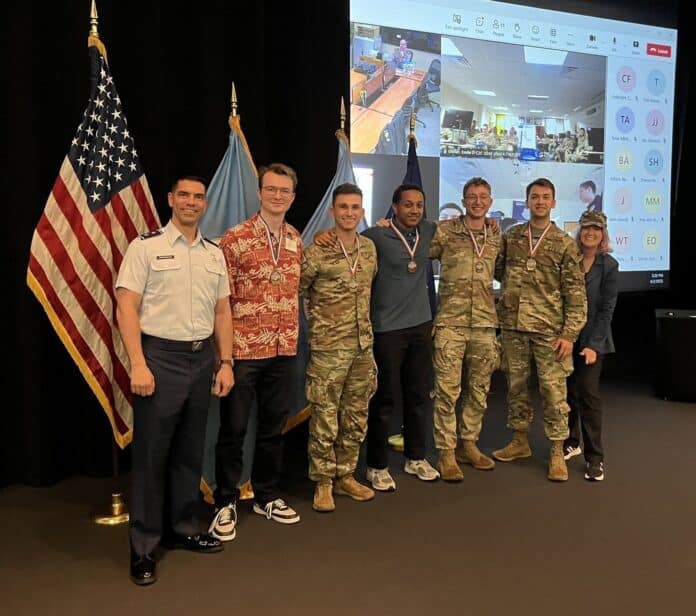Virginia Tech students took third place in the annual National Security Agency Cyber Exercise competition.
Behind only the U.S. Air Force Academy and U.S. Military Academy, the 19-person team bested the other 30-plus teams at the event in Linthicum Heights, Maryland, in April. This included topping the U.S. Naval Academy, U.S. Coast Guard Academy, and all the other senior military colleges and matched the Hokies’ best finish ever in the competitions.
“I was thrilled to see the camaraderie and close teamwork among our participants,” said Col. Jamie Cogbill, a Virginia Tech National Security Institute and Virginia Tech Corps of Cadets faculty member who served as the team’s coach. “Along with their technical competence, the close bonds and winning spirit they formed in various competitions and through their training and education at Virginia Tech were essential ingredients to their success.”
The three-day competition was broken up into challenges in specific areas such as cryptography, forensics, policy, and data analysis, and ended with an six-plus hour culminating Combat Cyber Exercise, in which Virginia Tech finished first.
“In that exercise, there are more elements, so they’re trying to see if we can put all of our skills together and use them at the same time,” said Wesley Flynn, a senior majoring in computer engineering. “The challenge was that we had eight virtual machines, four that we have full access to and another four that we don’t have access to directly, but they have vulnerabilities. Our job was to protect and secure the machines that we have access to and then to break into the machines that we don’t have access to.”
Virginia Tech’s team was made up of students individually affiliated with the Senior Military College Cyber Institute, the Corps of Cadets, and the Defense Civilian Training Corps — co-led by the Hume Center for National Security and Technology and part of the Virginia Tech National Security Institute and the Virginia Tech Corps of Cadets.
“Opportunities like this competition foster the skills our nation needs in the students for them to be its future cyber professionals and officers,” said Will Hanley, Virginia Tech’s deputy director for the Senior Military College Cyber Institute. “They gain skills like team building, technical acumen, and maintaining a competitive edge. The outstanding performance by these Hokie hackers reflects the committed partnership and investment by our National Security Institute, Senior Military Colleges Cyber Institute, and Corps of Cadets.”
Flynn, who is also the executive officer of the Virginia Tech cyber security club known as Cyber VT, said the competition gives students an opportunity to practice their skills in an environment that isn’t usually possible in the classroom or at club meetings.
“One thing that I haven’t seen in class and that’s really hard to emulate in our team sessions is the time crunch,” Flynn said. “In the competition, you have three hours to finish this exercise with a bunch of challenges and you need to work non-stop for those three hours to get it done. It’s not really realistic for us to have three-hour-long meetings every week where every team member is there and working non-stop with no breaks or distractions. By doing these challenges, we get practice locking in to accomplish a goal.”
Competitions like this can also help students get an idea of what they can expect if they pursue a career in cybersecurity.
“Something I find helpful that I’ve learned from competing in these challenges, like this one with the National Security Agency or another one we did with the Department of Energy, is learning what skills they find valuable,” Flynn said. “I can take the skills they asked us to perform at this competition and know that those are the ones I need to practice and focus on, because that’s what these agencies want us to know.”
Beyond technical skills, Flynn said teamwork and interdisciplinary skills is what set the Virginia Tech team apart from the competition.
“We had people with really different areas of expertise and, at first, I thought maybe we could have a harder time communicating or working together,” Flynn said. “But having different skills represented meant we were able to delegate tasks and each work on what we were best at, but also work as a unit when we needed to bring it all together.”
By Isabella Rossi


